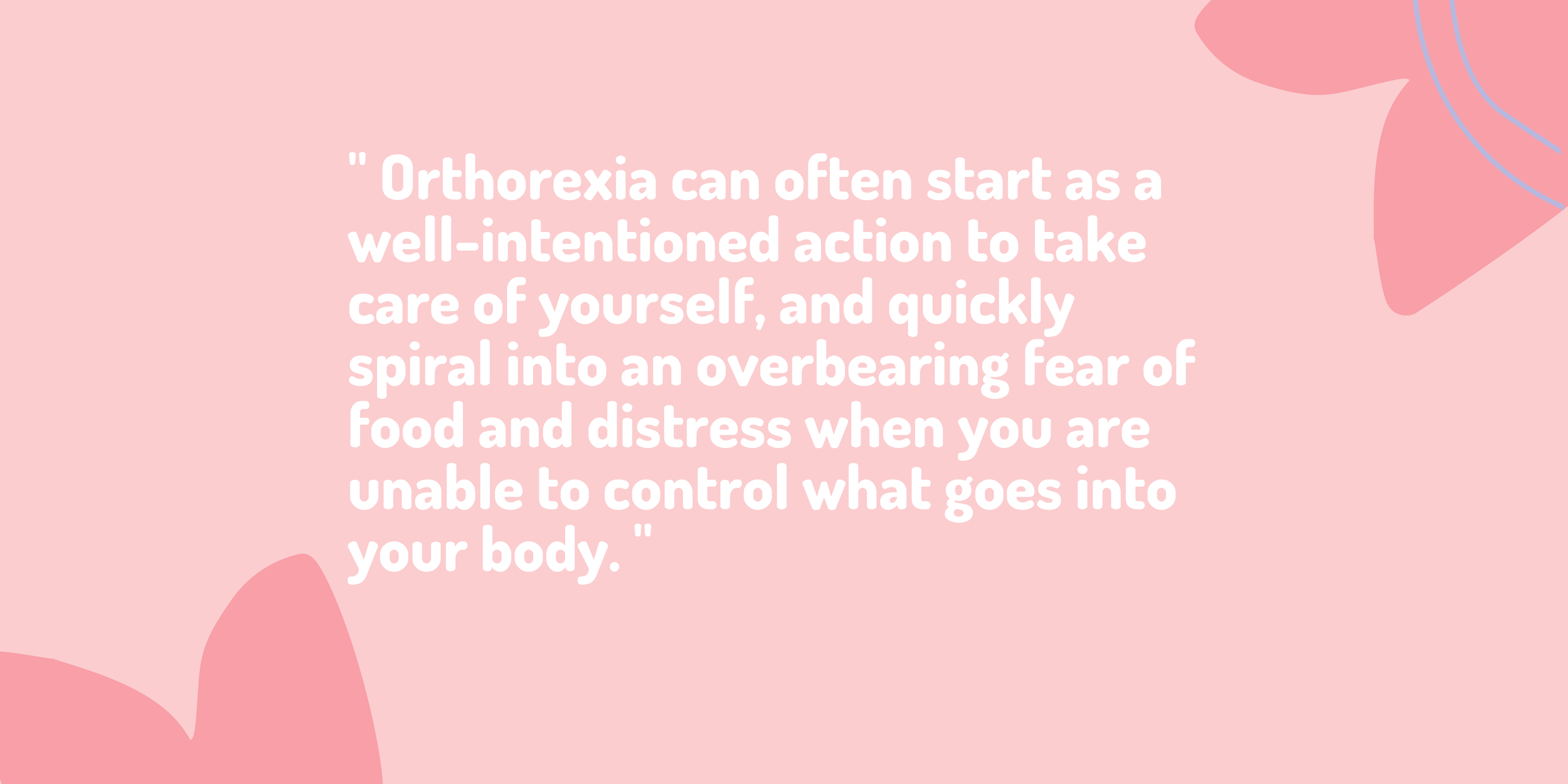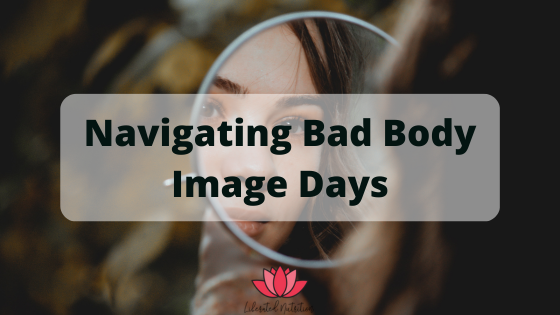How to Spot Orthorexia
What if your “healthy” eating is actually doing more harm than good? When is the pursuit of being "healthy" actually disordered?
I’m saying it now so you all know it’s coming, there is no such thing as perfect eating and the word “healthy” doesn’t have a single, narrow definition. Media, the diet industry, and a well-meaning medical provider might try to make us believe that there is a right way to eat in order to achieve health, and *spoiler alert* humans are far more complex than a prescriptive, one-size-fits-all list of rules. We come from different backgrounds, ethnicities, religions, cultures, and social circles. We find joy in different activities, feelings, and food. If we are all so different, how could we possibly all need to eat the same? How could people from all over the world live such long, full lives if their food varies so drastically?
In our culture, it is unfortunately very typical to see posts or media messaging encouraging people to cut out certain foods or eat a certain way; claiming to be the way to optimize health and well-being. Sometimes these incessant messages can push somebody towards developing Orthorexia, an obsession with “healthy” eating. It focuses on the idea of limiting intake to only those foods seen as the most “healthy” , “clean” and “pure.” Orthorexia can often start as a well-intentioned action to take care of yourself, and quickly spiral into an overbearing fear of food and distress when you are unable to control what goes into your body. At face value, it may appear to be a benign intention, and many may praise the behaviors and attitudes towards food as a commitment to being healthy. Behind the scenes, there is an intense preoccupation with eating a very narrow set of foods, and perhaps fear and anguish when those foods aren’t available. The foods might need to be of a certain quality, such as organic, or prepared a specific way. This can really limit when and where a person eats, diminishing not only the variety of their diet but also their satisfaction and enjoyment in food and eating experiences.
The truth is– nutrition does not always need to be so complex. Eating a variety of foods from various food groups nearly guarantees that most people will not develop any nutrient deficiencies.
How do I know if I’m struggling with orthorexia?
While this list isn’t exhaustive, it’s a good place to start. Do any of these moments resonate with you?
Missing out on social plans to avoid eating unfamiliar foods
Saying no to foods prepared by others or foods without a visible ingredient list
Feeling distress if your meal does not include fruit, vegetables, or whole grains
Avoiding foods cooked with fats that have not been promoted by influencers or the diet industry (i.e. seed oils, butter, etc)
Making decisions on a menu based on “health benefits” in place of taste preference
Fear of health consequences if you eat foods outside of your comfort zone
Preoccupation with the ingredients or chemicals in food items
Willingness to take supplements that have not been regulated or approved by the FDA over comfortably eating food
Needing to adjust recipes to be the “healthy” version of a food in order to eat them (think: black bean brownies, using whole wheat flour in all baked goods, using olive oil in place of butter, reducing the amount of sugar in a recipe)
Feeling morally superior to others based on your food choices
Having a limited list of accepted foods (outside of allergens)
Your friends and family regard you as the “healthy one” in the group
What’s the concern about having orthorexia?
While at first glance wanting to focus on health is not dangerous, limiting your intake to meet rigid standards can quickly put you at risk for future concerns including:
Malnutrition: This might feel a little ironic, however by hyper-focusing on food and avoiding items that are deemed “unhealthy,” a person is at risk of not meeting their body’s energy needs. Malnutrition puts a person at a higher risk for poor health conditions, hospitalizations, nutrient deficiencies, and digestive abnormalities. Laugh all you want, but don’t take for granted what it feels like to have consistent poops.
Potential development of an eating disorder: I have often seen orthorexia transition into a severe eating disorder. When somebody starts to equate their worth with their eating habits, it can become a slippery slope. Now’s the time to pause and ask for help.
Isolation: Rigidity around eating and saying no to social plans puts somebody at risk for social isolation. In some cases, isolation can lead to the development of depression, or worsening anxiety.
What if I feel better when I eat this way? Doesn’t that mean this is ok?
I believe you! I think it is entirely possible that you feel good in your body when you eat according to your definition of health.
I also think that our emotions play a large role in how we feel in our bodies. For example, think about a time when you were stressed or anxious. Did you notice any physical sensations? Think: butterflies, stomach pain, tight shoulders, clenched jaw, etc. Speaking for myself, these things do not usually feel great. If you have made rules around your food that lead to increased stress or anxiety around eating, isn’t it possible that the discomfort you may experience when eating foods outside what is “safe” could contribute to feeling unwell? And eating “safe” foods can promote a feeling of comfort and control. Could this then perpetuate the idea that you need to eat under rigid guidelines in order to remain feeling comfortable in your body?
I also ask you to consider– what about my life could be better if I was more accepting of all foods? How would your world grow? How might your relationships be different? You do not need to settle for something that has felt “ok” when there are ways to feel good and excited!
I’m the healthy friend! What will happen to my identity if I change this?
Change and growth are hard, and they are also what make us human! You are meant to learn and grow. Leaving behind a part of you that has brought comfort is hard, and you can do hard things.
While part of your identity may feel wrapped up in food, I am going to bet there are other interesting things about you. What are your hobbies? What kind of TV or books do you like? What’s your favorite craft? What is an activity you did as a kid that brought you joy? Reflecting on your relationship with food can be an opportunity for inspecting your sense of self and how aligned with your true values and interests you are.
If that doesn’t spark anything for you, think about your relationships. What do you like and respect about your friends? Is it solely based on their food and eating habits? Is it about their personality or the way they offer support and love? How do you display some of these qualities too?
If your current body requires you to eat in a certain, restrictive way in order to remain in the same size body, this is not the body that is healthy (notice: no quotation marks on this one) for you.
So, I’d encourage you to ask yourself: Is my pursuit of health potentially harmful? Are the rules that once made me feel safe causing more harm than good? If you’re feeling unsure, now’s a good time to ask and explore.
You do not need a diagnosis to seek support.








